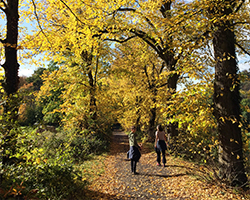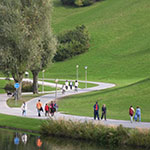Urban health
Two thirds of the population of the European Region live in towns and cities. Urban areas are often unhealthy places to live, characterized by heavy traffic, pollution, noise, violence and social isolation for elderly people and young families.
Read moreTop story
 Nature and biodiversity play a vital role in protecting human health
Nature and biodiversity play a vital role in protecting human health
Urbanization, land use, global trade and industrialization have led to profound and negative impacts on nature, biodiversity and ecosystems across the world. The ongoing depletion of natural resources not only affects environmental conditions but also has an enormous impact on the health, well-being and security of societies.
Healthy Cities

WHO Healthy Cities is a global movement. It engages local governments in health development through a process of political commitment, institutional change, capacity-building, partnership-based planning and innovative projects. Nearly 100 cities are members of the WHO European Healthy Cities Network, and 30 national Healthy Cities networks across the WHO European Region have more than 1400 cities and towns as members.
More about Healthy CitiesPolicy resources
WHO Member States in the WHO European Region have made various commitments on a range of issues including strengthening health systems, addressing the obesity epidemic, controlling the noncommunicable diseases epidemic and preparing to deal with the effects of climate change.
Read moreNew publication
 A multilevel governance approach to preventing and managing noncommunicable diseases: the role of cities and urban settings (2019)
More publications
A multilevel governance approach to preventing and managing noncommunicable diseases: the role of cities and urban settings (2019)
More publications
Nature, biodiversity and health
 The policy relevance of nature, biodiversity and health to WHO’s global and regional agenda
Read more
The policy relevance of nature, biodiversity and health to WHO’s global and regional agenda
Read more




